Although he says ‘tea party’ members have legitimate concerns, Obama puts core on ‘fringe’
By Jennifer Loven, APTuesday, March 30, 2010
Obama takes care in sizing up ‘tea party’ movement
WASHINGTON — President Barack Obama stepped carefully when talking for the first time about the conservative tea party movement, acknowledging it has legitimate concerns about federal reach and spending, but he contended the core of the loose anti-government network is “on the fringe.”
The latest political phenomenon, barely a year old, has leaders on both sides of the political spectrum puzzled.
Republicans want to co-opt the passion — and votes — of tea party disciples to help them oust Democrats from congressional control in the fall midterm elections, without losing other voters in the process. As for Democrats, they have focused mainly on trying to marginalize and ignore them. For instance, several Democratic officials say there’s no apparent strategy yet at the White House for combatting the network’s growing influence.
But the leaderless coalition, born in communities from coast to coast shortly after Obama’s inauguration last year, seems to have some staying power.
A Washington Post poll taken last week showed that more people view the movement favorably than unfavorably — and that 62 percent believe it has either the right amount or not enough influence on the Republican Party.
The group is decidedly conservative and libertarian, but otherwise diverse, divided over most everything except the need for limited government, less spending and an end to Obama’s policies. Those in the coalition have allegiance to no political party, with independent voters and even moderate Democrats among their ranks.
All that was reflected in Obama’s cautious handling of the topic, when asked about it Monday by a television interviewer.
The president said on NBC’s “Today” show that the movement is built around a “core group” of people who question whether he is a U.S. citizen and believe he is a socialist. Beyond that, however, he said he recognizes that the movement involves people with “mainstream, legitimate concerns” about the national debt, government expansion and big spending.
“I wouldn’t paint in broad brush and say that everybody who is involved or have gone to a tea party rally or meeting are somehow on the fringe,” Obama said. “I think that there’s a broader circle around that core group of people who are legitimately concerned about the deficit, who are legitimately concerned that the federal government may be taking on too much.”
He said he hopes that as “we’re tackling things like the deficit, imposing a freeze on domestic spending, taking steps that show we are sincere about dealing with our long-term problems, that some of that group will dissipate.”
Obama has talked a lot recently about anger in the electorate, particularly in the wake of the surprise victory in Massachusetts by Republican Scott Brown for a Senate seat. But it was the first time he had talked specifically about the group.
Some Democrats close to the White House think it may be a good thing for Obama and his team to mostly keep their distance. Engaging tea party activists too directly or aggressively could backfire by energizing them even more, many think.
The administration knows the tea party movement could help Republicans in the short-term by increasing the intensity of their voters. But the White House also is betting the activists’ influence could also be harmful, by yanking GOP candidates to the right — and farther away from the middle-of-the-spectrum voters who can decide elections, according to one official close to the president. The official spoke on condition of anonymity to discuss internal administration thinking.
Associated Press writers Ben Feller and Liz Sidoti contributed to this report.





